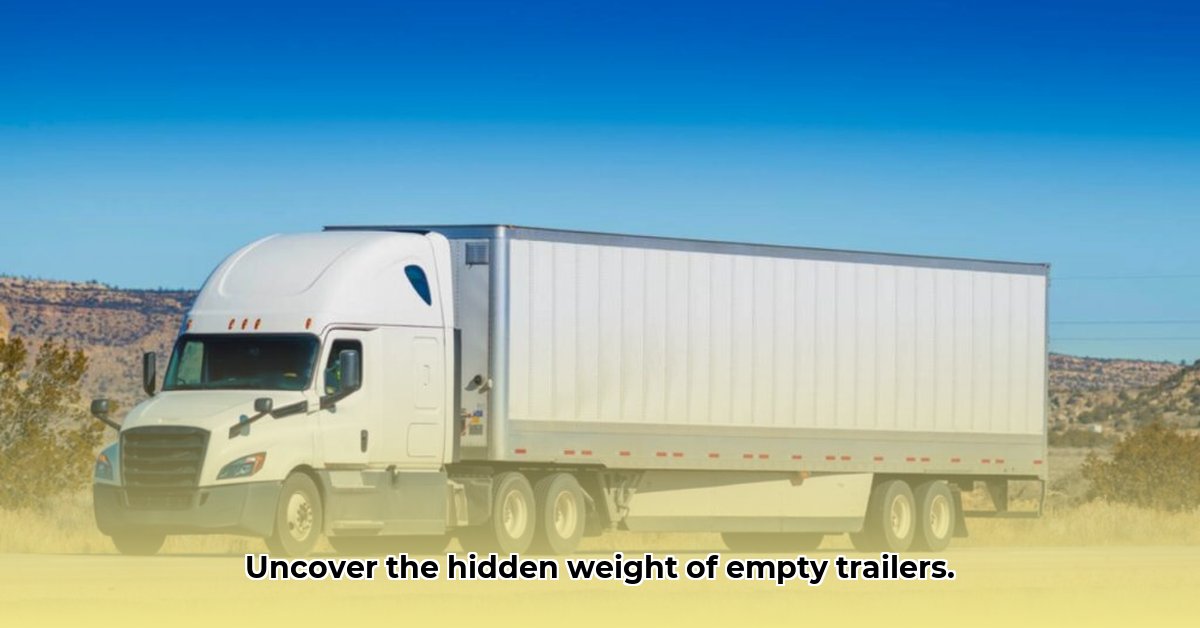
Knowing your empty tractor-trailer weight is crucial for safety, legal compliance, and efficient operations. This comprehensive guide provides a step-by-step approach to understanding and managing this critical aspect of trucking. For more on axle weight limits, check out this helpful resource: Max Axle Weight.
Factors Affecting Empty Weight
Several factors influence the weight of your empty rig. Think of it like building with LEGOs – each piece adds to the total weight.
- Truck Make and Model: Heavier-duty trucks naturally weigh more than lighter-duty models. Older trucks may weigh more due to rust and accumulated wear and tear.
- Trailer Type: Different trailers have vastly different weights. Refrigerated trailers (reefers) are heavier than flatbeds due to insulation and refrigeration units. Tankers are typically the heaviest due to their robust construction. The materials used (aluminum vs. steel) significantly impact trailer weight.
- Added Equipment: Extra features like toolboxes, ramps, and specialized racks all add weight. Even seemingly minor additions can have a cumulative effect.
- Fuel: The amount of fuel in your tanks significantly impacts the overall weight.
It's vital to consider these variables for an accurate assessment. Do you regularly haul oversized or specialized loads that require unique equipment? This will all add to the overall weight of your equipment.
Determining Empty Weight: Accurate Measurement Methods
Accurately determining your empty weight is paramount. Here are two primary methods:
1. Weigh Station Method (Most Accurate):
Use a certified truck scale at a weigh station. This provides the most precise measurement. Simply drive onto the scales and obtain a printed weight certificate. This is considered the gold standard for weight verification. Have you ever driven through a weigh station and had your truck weighed? What was your experience like?
2. Manufacturer's Specifications (A Good Starting Point):
Consult your truck and trailer manuals for their respective empty weights. Add these together for a preliminary estimate. Keep in mind this is an ideal weight; your actual weight may vary due to added equipment or wear. This method offers a quick estimate, but always cross-reference with actual weigh station data.
3. Regular Weighing:
Regularly weighing your empty rig after any modifications or repairs is critical to track weight changes and ensure continued compliance. Think of it like a check-up for your vehicle - regular monitoring helps identify potential issues early on. How often do you recommend weighing your truck?
Legal Weight Limits and Regulations: Navigating the Rules
Understanding Gross Vehicle Weight Rating (GVWR) and legal weight limits is non-negotiable. GVWR is the maximum permissible weight of your fully loaded truck and trailer. Exceeding these limits results in substantial fines and potential safety hazards.
State and federal regulations vary. Always consult the Department of Transportation (DOT) websites for the most up-to-date information for the states you'll be traversing. Regional variations can be significant, particularly regarding axle weight limits and permissible configurations. Do you have any experience with navigating varying weight regulations across different states?
Weight Management Strategies: Proactive Approaches
Effective weight management isn't simply about compliance; it improves safety, fuel efficiency, and profitability.
1. Load Planning: Ensure even weight distribution across axles to avoid overloading. This often requires strategic placement of cargo. 2. Driver Training: Invest in comprehensive driver training on proper weight distribution, load securing techniques, and regional regulations. 3. Technology: Utilize telematics systems for real-time weight monitoring, providing alerts for potential overloading issues. 4. Regular Maintenance: Prevent incremental weight increases from wear and tear through consistent maintenance.
Troubleshooting and Best Practices: Avoiding Common Pitfalls
Addressing common issues proactively can prevent costly problems.
- Inaccurate Weight Estimates: Use calibrated scales for consistent and accurate measurements.
- Neglecting Regional Regulations: Always check DOT websites for state-specific requirements before your journey.
- Insufficient Driver Training: Ongoing training reinforces safe practices and compliance with constantly evolving regulations.
Conclusion: The Importance of Accurate Weight Management
Accurate empty tractor-trailer weight management is vital for safety, legal compliance, and long-term cost savings. It reduces accident risk, enhances fuel efficiency, avoids penalties, and improves operational efficiency. By implementing the strategies outlined in this guide, you can build a safer, more profitable, and more legally sound trucking operation.